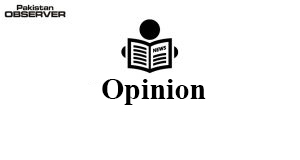Articles and letters may be edited for the purposes of clarity and space. They are published in good faith with a view to enlightening all the stakeholders. However, the contents of these writings may not necessarily match the views of the newspaper.
Economic crisis haunts Pakistan
While Pakistan faces an acute economic crisis, haunting national sovereignty and security, there seems to be neither the political will, by the federal government, or the state institutions, captive to their conflicts of interest, to increase revenues through uniform taxation. Without taxation, no state can function and maintain their sovereignty.
These endless Tax Amnesty Schemes and subsidies to cartels, dominated by the elite, has boosted culture of loot and plunder under the garb of welfare schemes and incentives to boost the economy. Pakistan has suffered and today we are in deep economic crisis. Ever since, the first Whitening Scheme launched in 1958, the black economy and tax evasion has haunted Pakistan’s economy. In 2000 Musharraf floated another Whitening Scheme, in which even incumbent cabinet members benefitted, followed by another in 2001.
The PPP offered another scheme in 2008, followed by PMLN in 2013 offering amnesty scheme to non-custom paid imported cars and other assets and again in 2016. The present PTI government which came to power with an agenda of reforms and broadening tax-net through digitalization, instead offered yet another generous Asset Declaration Scheme for whitening at less than 4% as compared to India which levied 45% in a similar scheme, resulting in declaration of $10 Billion assets.
It is no coincidence, given immense political clout they have, the biggest beneficiaries of State Subsidies and Tax Exemptions in a country facing a financial crunch happen to be cartels giving the highest dividends to their share-holders in 2021.
Fertilizer companies alone have paid cash dividends of Rs59Billion to their share- holders, followed by Power Generation with Rs34 billion, Food and Personal Care Rs26Billion, Chemical Rs25Billion, Tobacco Rs20.4Billion, Automobile Rs20.2, Cement Rs10.69Billion, Pharmaceuticals Rs9.48Billion etc. Whilst these cartels are reaping a harvest, tax collection has decreased and this is a recipe for ever widening deficit between state revenues and expenditure, leaving no fiscal space to provide relief and subsidies to most deprived sections of society.
MALIK TARIQ ALI
Lahore
NADRA Centre in Tangwani!
The intent behind writing this is to inform that a NADRA registration centre started issuing new CNIC and renewal of expired ones to the citizens as well as started issuing “B-Forms” to underage children on Friday 31st December, 2021.
The long cherished demand of the masses of Tangwani and suburbs was met when the sitting NADRA Chairman felt the need of establishing a branch office at Taluka headquarters. Obviously, the credit of opening NADRA registration centre in our town goes to PTI government because it lies under the jurisdiction of federal government. But the role of civil society can’t be ruled out who, time and again, raised the voice for its establishment. People belonging to different walks of life, social workers, religious and political activists appreciated and thanked high-ups on account of sanctioning this much needed scheme for the welfare of common people of the area.
NOOR KHAN BAKHRANI
Tangwani
Mental health support
According to an Agha Khan University study, the Covid-19 pandemic has aggravated the mental health crisis in Pakistan. Just ask anyone working for a school – they will tell you about the dramatic increase in student panic attacks caused by the dread of taking board exams after studying virtually for so long! Sadly, most schools are remiss about this and believe that students will just have to ‘keep calm and carry on.’
Pakistan’s high-end private schools do have mental health wellness counsellors, however, their work is made complicated by stigma. Moreover, school campuses tend to have just one mental wellness counsellor, regardless of the size of their student body. The purpose of the mental wellness counsellor is merely to facilitate students, and then make a recommendation for professional help.
Quite often, students are suffering from mental health issues that are aggravated at home. Consequently, they need a safe space where they can talk about their issues often times they want to open up to an experienced adult that they can trust. Inevitably, this person ends up being a teacher inside their school with whom they feel comfortable.
Now our efforts to combat the mental health crisis should not be limited to just conversation or de-stigmatization, instead we need to build the capacity of laypersons. Every school should have a comprehensive and transparent policy on students’ socio-emotional concerns. Practically, this would mean clear policies on issues like bullying, harassment and mental wellness.
We need to appropriately build the capacity of teachers, school administrators, parents, and students alike. A few basic steps towards building a community of care in schools could prevent many mental illnesses. Prevention is, after all, better than cure.
USAMA JAVED MIRZA
Islamabad
Save young people
Drug addiction is increasing day by day and it has engulfed Hub, the city which connects Balochistan to Sindh, along with many other parts of Balochistan and even entire Pakistan. There must be more and more rehabilitation centres in the country for the treatment of drug addicts. Not only this, the drug addicts should be enrolled in these rehabilitation centres for their better future.
Drug addiction not only harms a man. It harms a complete society. Due to drug addiction, people cannot distinguish between what is wrong and what is right? They go for stealing and adopt many other bad ways to earn money and buy themselves some drugs.
Recently, social welfare department established a drug rehabilitation centre in Hub which is a great achievement for the people of Hub. We hope that sooner or later, drug addiction will root out from the city.
SADIA FAZAL
Hub city










